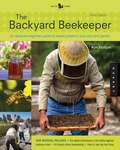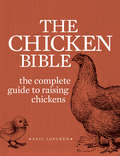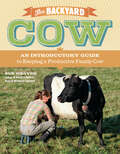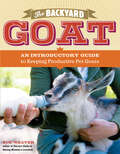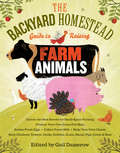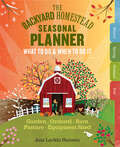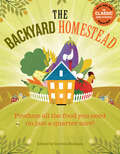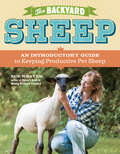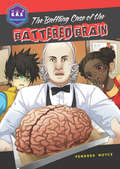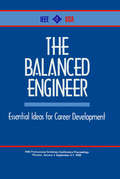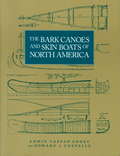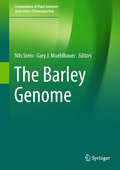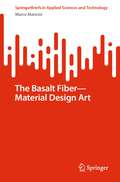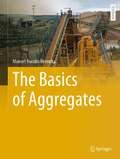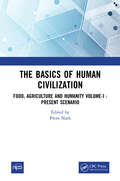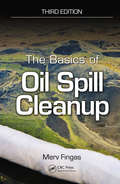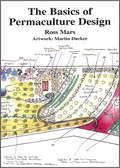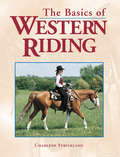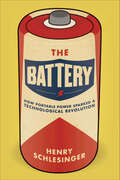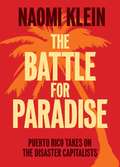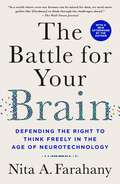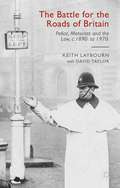- Table View
- List View
The Backyard Beekeeper: An Absolute Beginner's Guide to Keeping Bees in Your Yard and Garden
by Kim FlottumThis complete honey bee resource contains general information on bees; a how-to guide to the art of bee keeping and how to set up, care for, and harvest honey from your own colonies; as well as tons of bee-related facts and projects.
The Backyard Chicken Bible: The Complete Guide to Raising Chickens
by Eric LofgrenYour Backyard is the New Farm! Whether you want two chickens or two hundred, this manual will guide you along your journey to successfully raising chickens. Growing a backyard chicken flock is an investment, and one of the most important factors in cultivating a happy, healthy poultry society is taking the time to learn everything you can about your birds. The Backyard Chicken Bible is filled with real-life solutions and expert advice on what to do in almost any scenario you may find yourself in while raising chickens. No matter if you're starting with eggs, chicks or adult birds, you'll find the guidance you need to succeed. Inside you'll find: step-by-step processes for preparing your yard for chickens, caring for chicks when they arrive, maintaining the health and behavior of your flock, and addressing common issues illustrated explanations of the anatomy of a chicken detailed treatment advice for poultry diseases and ailments ideas for building coops and nest boxes step-by-step instructions for bathing, grooming, clipping wings, and trimming toe nails and beaks advice for common flock problems including hens that stop laying, aggressive roosters, and changing flock dynamics Take the guesswork out of raising chickens, and start preparing yourself now to be the best chicken farmer in your neighborhood!
The Backyard Cow: An Introductory Guide to Keeping a Productive Family Cow
by Sue WeaverYou don’t need acres of land to keep a cow healthy, happy, and productive. You can raise one right in your own backyard, producing more than enough milk for a single family — up to six gallons per day! The Backyard Cow covers everything you need to know, from selecting the right breed to understanding your cow’s behavior. With helpful advice on daily maintenance, milking, and bovine health care, you’ll soon be enjoying the pleasures of fresh milk, yogurt, cheese, and much more.
The Backyard Goat: An Introductory Guide to Keeping and Enjoying Pet Goats, from Feeding and Housing to Making Your Own Cheese
by Sue WeaverPulling carts around the farm or serving as loyal pack animals, goats are naturally hardworking and make for friendly companions. This straightforward guide teaches you how to choose, house, feed, train, and breed the best goats for your space and needs. Whether you want to churn out fresh dairy products, harvest soft cashmere for knitting, or keep goats as playful pets, The Backyard Goat makes it easy to enjoy the benefits of owning goats, with no experience necessary.
The Backyard Homestead Guide to Raising Farm Animals: Choose the Best Breeds for Small-Space Farming, Produce Your Own Grass-Fed Meat, Gather Fresh Eggs, Collect Fresh Milk, Make Your Own Cheese, Keep Chickens, Turkeys, Ducks, Rabbits, Goats, Sheep, Pigs, Cattle, & Bees (Backyard Homestead)
by Gail Damerow Richard E. Bonney Nancy Searle Heather Smith Thomas Paula Simmons Malcolm T. Sanford Kelly Klober Darrell L. SalsburyEnjoy a weekend breakfast featuring eggs, bacon, and honey from your own chickens, pigs, and bees, or a holiday meal with your own heritage-breed turkey as the main attraction. Gail Damerow covers everything you need to successfully raise your own farm animals, from selecting the right breeds to producing delicious fresh milk, cheese, honey, eggs, and meat. Even with just a small plot of land, you can become more self-sufficient, save money, and enjoy healthy, delicious animal products. Also available in this series: The Backyard Homestead, The Backyard Homestead Book of Building Projects, The Backyard Homestead Seasonal Planner, and The Backyard Homestead Book of Kitchen Know-How.
The Backyard Homestead Seasonal Planner: What to Do & When to Do It in the Garden, Orchard, Barn, Pasture & Equipment Shed (Backyard Homestead)
by Ann Larkin HansenThis hardworking addition to the best-selling Backyard Homestead series offers expert advice on what tasks to do around your farm and when to do them — no matter where on the planet you call home. Author Ann Larkin Hansen sets the priorities for each area of the farm, including the barn, garden, orchard, field, pasture, and woodlot. For every critical turn of the year (12 in all), Hansen provides an at-a-glance to-do list along with tips and a more in-depth discussion of key topics for the season. Easy-reference charts, checklists, and record-keeping sections help you keep track of it all.
The Backyard Homestead: Produce all the food you need on just a quarter acre! (Backyard Homestead)
by Carleen MadiganThis comprehensive guide to homesteading provides all the information you need to grow and preserve a sustainable harvest of grains and vegetables; raise animals for meat, eggs, and dairy; and keep honey bees for your sweeter days. With easy-to-follow instructions on canning, drying, and pickling, you’ll enjoy your backyard bounty all winter long.
The Backyard Sheep: An Introductory Guide to Keeping Productive Pet Sheep
by Sue WeaverRaise a flock of sheep in your backyard. Even with a limited amount of space, you can enjoy homegrown fleece and fresh milk, as well as the endearing company of these family-friendly animals. Sue Weaver provides all the instructions you need for selecting a breed; housing and feeding; harvesting fleece; and milking. With simple recipes for making cheese and yogurt, and tips on processing fleece for wool, you&’ll enjoy the varied and numerous rewards of keeping sheep.
The Baffling Case of Battered Brain
by Pendred NoyceWith time travel and mysteries that need solving, the Galactic Academy of Science (G.A.S.) series instructs readers on how to think like scientists. Under the guidance of a Dude or Dudette from the future, the middle school characters are faced with treacherous, present-day crimes that require a historical knowledge of science in order to be solved. From investigating problems to analyzing data and constructing explanations and solutions, this series blends elements of sci-fi with educational methods that distill the key thinking habits of scientists and engineers. Medical science combines with mystery in this G.A.S. adventure about concussions Is the awkward stranger taking bribes to throw games? When Clinton hits his head in the championship soccer game, the stranger gets him benched, and Clinton's team loses. Determined to nail the bribe-taker, Clinton and Mae take on a new G.A.S. mission--a journey across three continents and 4,000 years to learn about concussion and the brain.
The Balanced Engineer: Essential Ideas for Career Development
by IeeeThis book constitutes the Proceedings of the 1998 IEEE-USA Professional Activities Conference and the second annual professional activities conference. It assists individuals with the development of leadership, teamwork, negotiating, networking, and other professional skills.
The Banker's Wife: The addictive thriller that will keep you guessing
by Cristina AlgerSoon to be adapted for TV by Amazon and the makers of Homeland'An exciting journey into the dark under belly of the ultra-rich world of banking' The Times'Immersive, satisfying, tense - and timely: This is probably happening for real right now' Lee Child**********Two women who have lost so much.Two women with so much more to lose.Annabel - her husband has died in a plane crash. But was it really an accident?Marina - her editor has been found murdered. Is it a coincidence that he was working to expose a huge banking scandal?Two women who will stop at nothing to find out the truth.But the truth is not always what it seems.**********Praise for The Banker's Wife'Alger delivers an addictive dose of suspense and intrigue with a surprisingly believable plot' USA Today'A knockout of an international thriller' Chris Pavone, author of The Expats'One of the best thrillers you'll read all summer' Hello Giggles'A gripping, twisty thriller that asks how well we really know the people closest to us' Alafair Burke, author of The Wife
The Bar Code Rebellion (The Bar Code #2)
by Suzanne WeynThe second book in the action-packed Bar Code series.They want your identity. They want your freedom. They can't have them. The bar code rebellion.Kayla has resisted getting the bar code tattoo, even though it's mean forfeiting a "normal" life. Without the tattoo, she's an exile. But she can't stay an exile for long. . . .For reasons she doesn't completely understand--but will soon discover--Kayla is at the center of a lethal conspiracy that will soon threaten the very notion of freedom. Kayla can either give in to the bar code, or she can join the resistance and fight it. The choice, for her, is clear: It's time to fight.They want your identity.They want your freedom.They can't have them.The bar code rebellion.
The Bar Code Tattoo (The Bar Code #1)
by Suzanne WeynIndividuality vs. conformity. Identity vs. access. Freedom vs. control.The bar code tattoo.The bar code tattoo. Everybody's getting it. It will make your life easier, they say. It will hook you in. It will become your identity. But what if you say no? What if you don't want to become a code? For Kayla, this one choice changes everything. She becomes an outcast in her high school. Dangerous things happen to her family. There's no option but to run . . . for her life.Indivuality vs. conformity.. Identity vs. access. Freedom vs. control.The bar code tattoo.
The Bark Canoes and Skin Boats of North America
by Edwin Tappan Adney Howard I. ChappelleThe bark canoes of the North American Indians, particularly those of birchbark, were among the most highly developed manually propelled primitive watercraft. They could be used to carry heavy loads in shallow streams but were light enough to be hauled long distances over land. Built with Stone Age tools from available materials, their design, size, and appearance were varied to suit the many requirements of their users. Upon arrival in North America, European settlers began using the native-made craft for traveling through the wilderness. Even today, canoes are based on these ancient designs. This fascinating guide combines historical background with instructions for constructing one. Author Edwin Tappan Adney, born in 1868, devoted his life to studying canoes and was practically the sole scholar in his field. His papers and research have been assembled by a curator at the Smithsonian Institution, and illustrated with black-and-white line drawings, diagrams, and photos.Included here are measurements, detailed drawings, construction methods, and models. The book covers canoes from Newfoundland to the Pacific Ocean, as well as umiaks and kayaks from the Arctic.
The Barley Genome (Compendium of Plant Genomes)
by Gary J. Muehlbauer Nils SteinThis book presents an overview of the state-of-the-art in barley genome analysis, covering all aspects of sequencing the genome and translating this important information into new knowledge in basic and applied crop plant biology and new tools for research and crop improvement. Unlimited access to a high-quality reference sequence is removing one of the major constraints in basic and applied research. This book summarizes the advanced knowledge of the composition of the barley genome, its genes and the much larger non-coding part of the genome, and how this information facilitates studying the specific characteristics of barley.One of the oldest domesticated crops, barley is the small grain cereal species that is best adapted to the highest altitudes and latitudes, and it exhibits the greatest tolerance to most abiotic stresses. With comprehensive access to the genome sequence, barley’s importance as a genetic model in comparative studies on crop species like wheat, rye, oats and even rice is likely to increase.
The Basalt Fiber—Material Design Art (SpringerBriefs in Applied Sciences and Technology)
by Marco ManciniThis book presents a design research on the basalt fiber, a natural mineral material with important characteristics, and investigates the material's properties, production techniques, and most common uses, while also delving into aspects yet to be improved. The work presents a part of original research in between art and design, in which concepts, prototypes, and ideas are proposed, aimed at the enhancement of basalt fiber also from an esthetic point of view and not only from a performance one. By working on its perceived qualities and creative and formal potential, it is possible to support and extend the use of this material in many areas of design, including product, exhibit, cultural industries, and fashion. Considering that environmental regulations are increasingly stringent, the use of basalt fiber may in some cases be more advantageous than other popular technical fibers, both because of its own performance characteristics and specifically because of its inherent sustainability.
The Basics of Aggregates (Springer Textbooks in Earth Sciences, Geography and Environment)
by Manuel Bustillo RevueltaAggregates are among the most common natural resource used in everyday's life, having enhanced life quality. They are essential for construction, being utilized in nearly all residential, commercial, and industrial building construction and most public work projects such as roads, highways and bridges, railroad beds, dams, airports, tunnels, and many others. In the future, the rebuilding of deteriorated roads, highways, bridges, airports, seaports, and private and public buildings will require vast amounts of aggregate. Although it is almost impracticable to know the total amount of aggregates extracted every year globally, it is roughly estimated that annual aggregate production totals about 25 billion tons. Both developed and developing nations require extensive use of aggregates.The book "The Basics of Aggregates" covers all topics related to utilizing this type of material, including the properties of aggregates, types of deposits, geological occurrence, exploration methodologies and extraction methods, and processing techniques as well as their main applications and the importance of recycled aggregates. It serves as a basic text on aggregates for natural sciences and provides information about the main aggregate materials comprehensively with extensive number of illustrations and equips students to handle the mining cycle of aggregates. It enhances the understanding of the different aggregate types, being interdisciplinary and practice-oriented. This textbook addresses bachelor and master students of geology and general earth science as well as students of engineering and environmental sciences. It is written for undergraduate and graduate students, researches and professionals alike.
The Basics of Human Civilization: Food, Agriculture and Humanity Volume-I : Present Scenario
by Dr Prem NatThis publication tries to sketch present scenario on food, agriculture and humanity as its first volume. This book is intended to make attempt to update present scenario with reference to past in food agriculture and humanity and identify challenges, followed by opportunities to bring changes in food habits and preferences, technology, and proper implementation of programmes and of proper utilization of a natural resources. Mention has been made of food and agriculture policies and developments improved agriculture challenges and opportunities and to address them appropriately.Note: T&F does not sell or distribute the hardback in India, Pakistan, Nepal, Bhutan, Bangladesh and Sri Lanka. This title is co-published with NIPA.
The Basics of Oil Spill Cleanup
by Merv FingasReflecting the rapid progress in cleanup technology since the previous edition, this revised and expanded third edition of The Basics of Oil Spill Cleanup covers current cleanup techniques, how oil spills are measured and detected, and the properties of the oil and its long-term fate in the environment. It also deals with why, how often, and where
The Basics of Permaculture Design
by Ross Mars"The Basics of Permaculture Design", first published in Australia in 1996, is an excellent introduction to the principles of permaculture, design processes, and the tools needed for designing sustainable gardens, farms, and larger communities. Packed with useful tips, clear illustrations, and a wealth of experience, it guides you through designs for gardens, urban and rural properties, water harvesting systems, animal systems, permaculture in small spaces like balconies and patios, farms, schools, and ecovillages. This is both a do-ityourself guide for the enthusiast and a useful reference for permaculture designers.
The Basics of Western Riding
by Charlene Strickland Martha JoseyGet in the saddle and experience the thrills, challenges, and fun of Western riding! In this comprehensive introductory guide, veteran trainer Charlene Strickland covers everything from safe horse handling procedures and basic Western riding techniques to stylish competition outfits. With plenty of encouragement and a contagious passion, Strickland provides easy-to-follow riding instructions along with expert advice on evaluating horses and appropriate tack. You’ll soon be enjoying pleasurable rides both in the training ring and out on the trail.
The Battery: How Portable Power Sparked a Technological Revolution
by Henry SchlesingerIn the tradition of Mark Kurlansky's Cod and David Bodanis's E=MC2, The Battery is the first popular history of the technology that harnessed electricity and powered the greatest scientific and technological advances of our time.What began as a long-running dispute in biology, involving a dead frog's twitching leg, a scalpel, and a metal plate, would become an invention that transformed the history of the world: the battery. From Alessandro Volta's first copper-and-zinc model in 1800 to twenty-first-century technological breakthroughs, science journalist Henry Schlesinger traces the history of this essential power source and demonstrates its impact on our lives.Volta's first battery not only settled the frog's leg question, it also unleashed a field of scientific research that led to the discovery of new elements and new inventions, from Samuel Morse's telegraph to Alexander Graham Bell's telephone to Thomas Edison's incandescent lightbulb. And recent advances like nanotechnology are poised to create a new generation of paradigm-shifting energy sources.Schlesinger introduces the charlatans and geniuses, paupers and magnates, attracted to the power of the battery, including Michael Faraday, Guglielmo Marconi, Gaylord Wilshire, and Hugo Gernsback, the publisher and would-be inventor who coined the term "science fiction." A kaleidoscopic tour of an ingenious invention that helped usher in the modern world, The Battery is as entertaining as it is enlightening.
The Battle For Paradise: Puerto Rico Takes On The Disaster Capitalists
by Naomi Klein"We are in a fight for our lives. Hurricanes Irma and María unmasked the colonialism we face in Puerto Rico, and the inequality it fosters, creating a fierce humanitarian crisis. Now we must find a path forward to equality and sustainability, a path driven by communities, not investors. And this book explains, with careful and unbiased reporting, only the efforts of our community activists can answer the paramount question: What type of society do we want to become and who is Puerto Rico for?"--Carmen Yulín Cruz, Mayor of San Juan <P><P> In the rubble of Hurricane Maria, Puerto Ricans and ultrarich "Puertopians" are locked in a pitched struggle over how to remake the island. In this vital and startling investigation, bestselling author and activist Naomi Klein uncovers how the forces of shock politics and disaster capitalism seek to undermine the nation's radical, resilient vision for a "just recovery." <P><P> All royalties from the sale of this book in English and Spanish go directly to JunteGente, a gathering of Puerto Rican organizations resisting disaster capitalism and advancing a fair and healthy recovery for their island. For more information, visit http://juntegente.org/. <P><P> Naomi Klein is an award-winning journalist, syndicated columnist, documentary filmmaker and author of the international bestsellers No Logo: Taking Aim at the Brand Bullies, The Shock Doctrine: The Rise of Disaster Capitalism, This Changes Everything: Capitalism vs. the Climate, and No Is Not Enough.
The Battle for Your Brain: Defending the Right to Think Freely in the Age of Neurotechnology
by Nita A. FarahanyA new dawn of brain tracking and hacking is coming. Will you be prepared for what comes next?Imagine a world where your brain can be interrogated to learn your political beliefs, your thoughts can be used as evidence of a crime, and your own feelings can be held against you. A world where people who suffer from epilepsy receive alerts moments before a seizure, and the average person can peer into their own mind to eliminate painful memories or cure addictions.Neuroscience has already made all of this possible today, and neurotechnology will soon become the “universal controller” for all of our interactions with technology. This can benefit humanity immensely, but without safeguards, it can seriously threaten our fundamental human rights to privacy, freedom of thought, and self-determination.From one of the world’s foremost experts on the ethics of neuroscience, The Battle for Your Brain offers a path forward to navigate the complex legal and ethical dilemmas that will fundamentally impact our freedom to understand, shape, and define ourselves.
The Battle for the Roads of Britain
by David Taylor Keith LaybournThe onset of the automobile, both cars and other vehicles, on British roads brought about a seismic change in the social, economic and political history of Britain. Cars fundamentally challenged the established democracy of the road by forcing the authorities to channel the pedestrian, and children, out of the way of the unforgiving automobile and educating them in exercising road safety. They also forced the police to implement the three Es of 'Enforcement, Engineering and Education' – enforcing the law of the road, pressing for new technology for signals and other technologies, and educating school children - in an impartial attempt to ensure that life was protected. In this process, the police should not be seen as the tools of the motorists, middle class or working class, but as the impartial enforcers of legislation, introducing as such the 'policeman-state'. Consequently, policing fundamentally changed in Britain between 1900 and 1970, as the police moved from their 'feet to their seats' in controlling traffic as British policing became more integrated and introduced new technology and modern systems.
